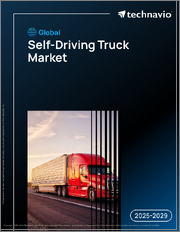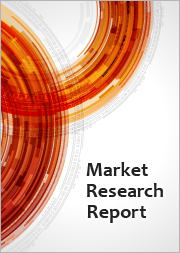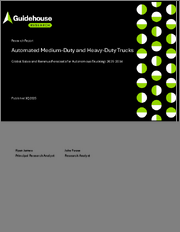
|
시장보고서
상품코드
1765200
자율주행 트럭 시장Autonomous Trucks |
||||||
자율주행 트럭 세계 시장은 2030년까지 15억 달러에 도달
2024년에 4억 8,330만 달러로 추정되는 자율주행 트럭 세계 시장은 2030년에는 15억 달러에 이르고, 분석 기간인 2024-2030년 CAGR은 20.3%를 보일 전망입니다.
미국 시장은 1억 3,550만 달러로 추정, 중국은 CAGR19.1%로 성장 예측
미국의 자율주행 트럭 시장은 2024년에 1억 3,550만 달러로 추정됩니다. 세계 2위 경제대국인 중국은 분석 기간인 2024-2030년 CAGR 19.1%로 2030년까지 2억 1,850만 달러 규모에 이를 것으로 예측됩니다. 기타 주목해야 할 지역별 시장으로서는 일본과 캐나다가 있으며, 분석 기간중 CAGR은 각각 18.0%와 17.0%를 보일 것으로 예측됩니다. 유럽에서는 독일이 CAGR 약 13.8%를 보일 전망입니다.
세계의 자율주행 트럭 시장 - 주요 동향과 촉진요인 정리
물류 분야에서의 자율주행 트럭 도입의 원동력은 무엇인가?
자율주행 트럭은 안전, 효율성, 비용 절감을 약속하는 물류 및 운송 산업의 혁신적 솔루션으로 부상하고 있습니다. 이러한 자율주행 트럭은 인공지능(AI), 머신러닝, 센서, 카메라, 레이더, LiDAR 시스템 등 첨단 기술을 활용하여 인간의 개입 없이 내비게이션과 운행을 수행합니다. 운전자 부족 문제를 해결하고, 운영 비용을 절감하고, 화물 운송의 신뢰성을 높여야 할 필요성이 높아지면서 자율 주행 트럭의 채택을 촉진하고 있습니다. 기업들은 물류 업무 간소화, 연료 소비 감소, 경로 계획 최적화를 위해 자율 주행 트럭 운송 기술에 대한 투자를 늘리고 있습니다. 자율 주행 트럭의 연속 운행 능력은 장거리 화물 운송에 특히 유리하며, 공급망 효율성을 향상시키는 효과적인 솔루션이 되고 있습니다.
기술 발전은 자율주행 트럭 시장을 어떻게 형성하고 있는가?
기술 발전은 자율주행 트럭의 미래를 형성하는 데 중요한 역할을 하고 있으며, AI와 머신러닝의 혁신은 자율주행 트럭의 의사결정 능력을 향상시켜 복잡한 교통 상황을 해석하고 그에 따라 대응할 수 있도록 하고, V2X(Vehicle-to-Everything) 통신 시스템의 개발로 트럭이 다른 차량과 통신할 수 있게 되어 상황 인식과 안전성이 향상되었습니다. V2X(Vehicle-to-Everything) 통신 시스템의 개발로 트럭이 다른 차량, 교통 신호 및 인프라와 통신할 수 있게 되어 상황 인식과 안전성이 향상되고 있습니다. 또한, 어댑티브 크루즈 컨트롤, 차선 유지 보조, 자동 긴급 제동과 같은 ADAS(첨단 운전자 보조 시스템)의 통합은 더 높은 수준의 자율성을 위한 기반을 제공합니다. 전기 및 수소 자동차의 부상도 지속가능성에 대한 관심과 운송 분야에서의 이산화탄소 배출량 감소와 맞물려 시장 잠재력을 확대하고 있습니다.
자율 주행 트럭의 채택을 주도하는 시장 세분화는 어떤 시장 세분화인가?
자율주행 트럭 시장은 유형, 부품, 용도, 지역별로 구분됩니다. 자율 주행 트럭의 유형에는 완전 자율형과 준자율 주행 트럭이 있으며, 규제상의 제약과 단계적 도입의 필요성으로 인해 현재 준자율 주행 트럭이 시장을 독점하고 있습니다. 자율 주행 트럭의 주요 구성 요소에는 하드웨어(센서, 카메라, LiDAR, 레이더)와 소프트웨어(AI 알고리즘, 데이터 분석, 차량 관리 시스템)가 포함되며, 소프트웨어 솔루션은 의사 결정 및 경로 최적화 역할을 수행하기 때문에 많은 지지를 받고 있습니다. 자율주행 트럭의 용도는 장거리 화물, 라스트 마일 배송, 광업, 농업, 건설에 이르기까지 다양하며, 장거리 화물은 국가 간 운송 및 주 간 운송의 효율화 필요성으로 인해 가장 큰 비중을 차지하고 있습니다. 지리적으로 북미와 유럽은 연구개발에 대한 높은 투자, 유리한 규제 프레임워크, 주요 기술 제공업체의 존재로 인해 자율주행 트럭 시장을 주도하고 있습니다. 반면, 아시아태평양은 급속한 산업화와 물류 자동화 수요 증가로 인해 고성장 지역으로 부상하고 있습니다.
자율주행 트럭 시장의 주요 성장 동력은 무엇인가?
자율주행 트럭 시장의 성장은 AI와 머신러닝의 발전, 운전자 부족 문제 해결의 필요성 증대, 운영 비용 절감과 물류 효율성 향상에 대한 관심 증가 등 여러 요인에 의해 촉진되고 있습니다. 향상된 안전 기능, 실시간 데이터 분석, 경로 최적화 기능을 갖춘 자율 주행 트럭 기술의 개발은 장거리 화물 운송 및 공급망 운영에서의 채택을 촉진하고 있습니다. 지속가능성에 대한 관심이 높아지면서 전기 및 수소로 구동되는 트럭으로의 전환이 진행됨에 따라 물류 기업 및 차량 운영자 사이에서 시장 저변이 확대되고 있습니다. 안전 문제를 해결하고 세계 표준을 준수하기 위한 강력한 사이버 보안 솔루션 개발에 집중하면서 기술 혁신과 시장 성장의 새로운 기회가 창출되고 있습니다. 또한, 자동차 제조업체, 기술 기업, 물류 제공업체 간의 전략적 파트너십과 협력 관계 증가는 시장 확대를 더욱 촉진하고 있습니다.
부문
부문(자율주행 트럭)
조사 대상 기업 예
- Hermes Robotics
- KAMAZ PTC
- MARS Auto
- NVIDIA Corporation
- Plus.ai
- QuickLoadz
- Siemens AG
- TomTom International BV
- Uber Freight LLC
- Uber Technologies, Inc.
AI 통합
Global Industry Analysts는 유효한 전문가 컨텐츠와 AI툴에 의해 시장 정보와 경쟁 정보를 변혁하고 있습니다.
Global Industry Analysts는 일반적인 LLM나 업계별 SLM 쿼리에 따르는 대신에, 비디오 기록, 블로그, 검색 엔진 조사, 대량 기업, 제품/서비스, 시장 데이터 등, 전 세계 전문가로부터 수집한 컨텐츠 리포지토리를 구축했습니다.
관세 영향 계수
Global Industry Analysts는 본사의 국가, 제조거점, 수출입(완제품 및 OEM)을 기반으로 기업의 경쟁력 변화를 예측했습니다. 이러한 복잡하고 다면적인 시장 역학은 수익원가(COGS) 증가, 수익성 감소, 공급망 재편 등 미시적 및 거시적 시장 역학 중에서도 특히 경쟁사들에게 영향을 미칠 것으로 예측됩니다.
목차
제1장 조사 방법
제2장 주요 요약
- 시장 개요
- 주요 기업
- 시장 동향과 촉진요인
- 세계 시장 전망
제3장 시장 분석
- 미국
- 캐나다
- 일본
- 중국
- 유럽
- 프랑스
- 독일
- 이탈리아
- 영국
- 기타 유럽
- 아시아태평양
- 기타 지역
제4장 경쟁
LSH 25.07.16Global Autonomous Trucks Market to Reach US$1.5 Billion by 2030
The global market for Autonomous Trucks estimated at US$483.3 Million in the year 2024, is expected to reach US$1.5 Billion by 2030, growing at a CAGR of 20.3% over the analysis period 2024-2030.
The U.S. Market is Estimated at US$135.5 Million While China is Forecast to Grow at 19.1% CAGR
The Autonomous Trucks market in the U.S. is estimated at US$135.5 Million in the year 2024. China, the world's second largest economy, is forecast to reach a projected market size of US$218.5 Million by the year 2030 trailing a CAGR of 19.1% over the analysis period 2024-2030. Among the other noteworthy geographic markets are Japan and Canada, each forecast to grow at a CAGR of 18.0% and 17.0% respectively over the analysis period. Within Europe, Germany is forecast to grow at approximately 13.8% CAGR.
Global Autonomous Trucks Market - Key Trends and Drivers Summarized
What Is Driving the Adoption of Autonomous Trucks in the Logistics Sector?
Autonomous trucks are emerging as a transformative solution in the logistics and transportation industry, promising enhanced safety, efficiency, and cost savings. These self-driving trucks use advanced technologies such as artificial intelligence (AI), machine learning, sensors, cameras, radar, and LiDAR systems to navigate and operate without human intervention. The growing need to address driver shortages, reduce operational costs, and increase the reliability of freight transport is driving the adoption of autonomous trucks. Companies are increasingly investing in autonomous trucking technologies to streamline logistics operations, reduce fuel consumption, and optimize route planning. The ability of autonomous trucks to operate continuously without breaks is particularly advantageous for long-haul freight transportation, making them a viable solution for improving supply chain efficiency.
How Are Technological Advancements Shaping the Autonomous Truck Market?
Technological advancements are playing a critical role in shaping the future of autonomous trucks, making them safer, more efficient, and adaptable to various road conditions. Innovations in AI and machine learning are enhancing the decision-making capabilities of autonomous trucks, allowing them to interpret complex traffic situations and respond accordingly. The development of vehicle-to-everything (V2X) communication systems is enabling trucks to communicate with other vehicles, traffic signals, and infrastructure, improving situational awareness and safety. Furthermore, the integration of advanced driver-assistance systems (ADAS), such as adaptive cruise control, lane-keeping assistance, and automated emergency braking, is providing a foundation for higher levels of autonomy. The emergence of electric and hydrogen-powered autonomous trucks is also expanding the market potential by aligning with the growing emphasis on sustainability and reducing carbon emissions in transportation.
Which Market Segments Are Leading the Adoption of Autonomous Trucks?
The autonomous truck market is segmented by type, component, application, and region. Types of autonomous trucks include fully autonomous and semi-autonomous trucks, with semi-autonomous trucks currently dominating the market due to regulatory constraints and the need for gradual adoption. Key components of autonomous trucks include hardware (sensors, cameras, LiDAR, radar) and software (AI algorithms, data analytics, fleet management systems), with software solutions gaining traction due to their role in decision-making and route optimization. Applications of autonomous trucks span long-haul freight, last-mile delivery, mining, agriculture, and construction, with long-haul freight being the largest segment due to the need for efficiency in cross-country and inter-state transportation. Geographically, North America and Europe lead the market for autonomous trucks due to high investments in R&D, favorable regulatory frameworks, and the presence of major technology providers, while Asia-Pacific is emerging as a high-growth region driven by rapid industrialization and increasing demand for automation in logistics.
What Are the Key Drivers of Growth in the Autonomous Truck Market?
The growth in the autonomous truck market is driven by several factors, including advancements in AI and machine learning, the increasing need to address driver shortages, and the rising focus on reducing operational costs and enhancing logistics efficiency. The development of autonomous trucking technologies with enhanced safety features, real-time data analytics, and route optimization capabilities is driving their adoption in long-haul freight and supply chain operations. The growing emphasis on sustainability and the transition towards electric and hydrogen-powered autonomous trucks is expanding the market reach among logistics companies and fleet operators. The focus on developing robust cybersecurity solutions to address safety concerns and ensure compliance with global standards is creating new opportunities for innovation and market growth. Additionally, the rising number of strategic partnerships and collaborations among automakers, technology firms, and logistics providers is further supporting market expansion.
SCOPE OF STUDY:
The report analyzes the Autonomous Trucks market in terms of units by the following Segments, and Geographic Regions/Countries:
Segments:
Segment (Autonomous Trucks)
Geographic Regions/Countries:
World; United States; Canada; Japan; China; Europe (France; Germany; Italy; United Kingdom; and Rest of Europe); Asia-Pacific; Rest of World.
Select Competitors (Total 44 Featured) -
- Hermes Robotics
- KAMAZ PTC
- MARS Auto
- NVIDIA Corporation
- Plus.ai
- QuickLoadz
- Siemens AG
- TomTom International BV
- Uber Freight LLC
- Uber Technologies, Inc.
AI INTEGRATIONS
We're transforming market and competitive intelligence with validated expert content and AI tools.
Instead of following the general norm of querying LLMs and Industry-specific SLMs, we built repositories of content curated from domain experts worldwide including video transcripts, blogs, search engines research, and massive amounts of enterprise, product/service, and market data.
TARIFF IMPACT FACTOR
Our new release incorporates impact of tariffs on geographical markets as we predict a shift in competitiveness of companies based on HQ country, manufacturing base, exports and imports (finished goods and OEM). This intricate and multifaceted market reality will impact competitors by increasing the Cost of Goods Sold (COGS), reducing profitability, reconfiguring supply chains, amongst other micro and macro market dynamics.
TABLE OF CONTENTS
I. METHODOLOGY
II. EXECUTIVE SUMMARY
- 1. MARKET OVERVIEW
- Influencer Market Insights
- Tariff Impact on Global Supply Chain Patterns
- Global Economic Update
- Autonomous Trucks - Global Key Competitors Percentage Market Share in 2025 (E)
- Competitive Market Presence - Strong/Active/Niche/Trivial for Players Worldwide in 2025 (E)
- 2. FOCUS ON SELECT PLAYERS
- 3. MARKET TRENDS & DRIVERS
- Increasing Adoption of Autonomous Trucks in Long-Haul Freight Transportation Spurs Market Growth
- Technological Advancements in AI, Machine Learning, and Sensors Propel Innovation in Autonomous Trucking
- Focus on Enhancing Fuel Efficiency and Reducing Carbon Emissions Drives Adoption of Autonomous Trucks
- Emergence of Autonomous Truck Platooning and Convoy Systems Expands Market Reach
- Increasing Use of Autonomous Trucks in Mining, Agriculture, and Construction Industries Boosts Market Potential
- Shift Towards Electric and Hydrogen-Powered Autonomous Trucks Creates New Growth Avenues
- Growing Emphasis on Vehicle-to-Everything (V2X) Communication and Connectivity Spurs Market Innovation
- Focus on Developing Robust Cybersecurity Solutions for Autonomous Trucks to Address Safety Concerns
- Emergence of Self-Driving Trucks as a Key Component of Smart City Logistics Expands Addressable Market
- Rising Demand for Real-Time Data Analytics and Fleet Management Solutions in Autonomous Trucking Enhances Market Competitiveness
- Focus on Ensuring Compliance with Global Standards and Certification Processes Drives Market Adoption
- 4. GLOBAL MARKET PERSPECTIVE
- TABLE 1: World Autonomous Trucks Market Analysis of Annual Sales in US$ Thousand for Years 2015 through 2030
- TABLE 2: World Recent Past, Current & Future Analysis for Autonomous Trucks by Geographic Region - USA, Canada, Japan, China, Europe, Asia-Pacific and Rest of World Markets - Independent Analysis of Annual Sales in US$ Thousand for Years 2024 through 2030 and % CAGR
- TABLE 3: World 6-Year Perspective for Autonomous Trucks by Geographic Region - Percentage Breakdown of Value Sales for USA, Canada, Japan, China, Europe, Asia-Pacific and Rest of World Markets for Years 2025 & 2030
III. MARKET ANALYSIS
- UNITED STATES
- Autonomous Trucks Market Presence - Strong/Active/Niche/Trivial - Key Competitors in the United States for 2025 (E)
- TABLE 4: USA Recent Past, Current & Future Analysis for Autonomous Trucks by Segment - Autonomous Trucks - Independent Analysis of Annual Sales in US$ Thousand for the Years 2024 through 2030 and % CAGR
- CANADA
- TABLE 5: Canada Recent Past, Current & Future Analysis for Autonomous Trucks by Segment - Autonomous Trucks - Independent Analysis of Annual Sales in US$ Thousand for the Years 2024 through 2030 and % CAGR
- JAPAN
- Autonomous Trucks Market Presence - Strong/Active/Niche/Trivial - Key Competitors in Japan for 2025 (E)
- TABLE 6: Japan Recent Past, Current & Future Analysis for Autonomous Trucks by Segment - Autonomous Trucks - Independent Analysis of Annual Sales in US$ Thousand for the Years 2024 through 2030 and % CAGR
- CHINA
- Autonomous Trucks Market Presence - Strong/Active/Niche/Trivial - Key Competitors in China for 2025 (E)
- TABLE 7: China Recent Past, Current & Future Analysis for Autonomous Trucks by Segment - Autonomous Trucks - Independent Analysis of Annual Sales in US$ Thousand for the Years 2024 through 2030 and % CAGR
- EUROPE
- Autonomous Trucks Market Presence - Strong/Active/Niche/Trivial - Key Competitors in Europe for 2025 (E)
- TABLE 8: Europe Recent Past, Current & Future Analysis for Autonomous Trucks by Geographic Region - France, Germany, Italy, UK and Rest of Europe Markets - Independent Analysis of Annual Sales in US$ Thousand for Years 2024 through 2030 and % CAGR
- TABLE 9: Europe 6-Year Perspective for Autonomous Trucks by Geographic Region - Percentage Breakdown of Value Sales for France, Germany, Italy, UK and Rest of Europe Markets for Years 2025 & 2030
- FRANCE
- Autonomous Trucks Market Presence - Strong/Active/Niche/Trivial - Key Competitors in France for 2025 (E)
- TABLE 10: France Recent Past, Current & Future Analysis for Autonomous Trucks by Segment - Autonomous Trucks - Independent Analysis of Annual Sales in US$ Thousand for the Years 2024 through 2030 and % CAGR
- GERMANY
- Autonomous Trucks Market Presence - Strong/Active/Niche/Trivial - Key Competitors in Germany for 2025 (E)
- TABLE 11: Germany Recent Past, Current & Future Analysis for Autonomous Trucks by Segment - Autonomous Trucks - Independent Analysis of Annual Sales in US$ Thousand for the Years 2024 through 2030 and % CAGR
- ITALY
- TABLE 12: Italy Recent Past, Current & Future Analysis for Autonomous Trucks by Segment - Autonomous Trucks - Independent Analysis of Annual Sales in US$ Thousand for the Years 2024 through 2030 and % CAGR
- UNITED KINGDOM
- Autonomous Trucks Market Presence - Strong/Active/Niche/Trivial - Key Competitors in the United Kingdom for 2025 (E)
- TABLE 13: UK Recent Past, Current & Future Analysis for Autonomous Trucks by Segment - Autonomous Trucks - Independent Analysis of Annual Sales in US$ Thousand for the Years 2024 through 2030 and % CAGR
- REST OF EUROPE
- TABLE 14: Rest of Europe Recent Past, Current & Future Analysis for Autonomous Trucks by Segment - Autonomous Trucks - Independent Analysis of Annual Sales in US$ Thousand for the Years 2024 through 2030 and % CAGR
- ASIA-PACIFIC
- Autonomous Trucks Market Presence - Strong/Active/Niche/Trivial - Key Competitors in Asia-Pacific for 2025 (E)
- TABLE 15: Asia-Pacific Recent Past, Current & Future Analysis for Autonomous Trucks by Segment - Autonomous Trucks - Independent Analysis of Annual Sales in US$ Thousand for the Years 2024 through 2030 and % CAGR
- REST OF WORLD
- TABLE 16: Rest of World Recent Past, Current & Future Analysis for Autonomous Trucks by Segment - Autonomous Trucks - Independent Analysis of Annual Sales in US$ Thousand for the Years 2024 through 2030 and % CAGR



















